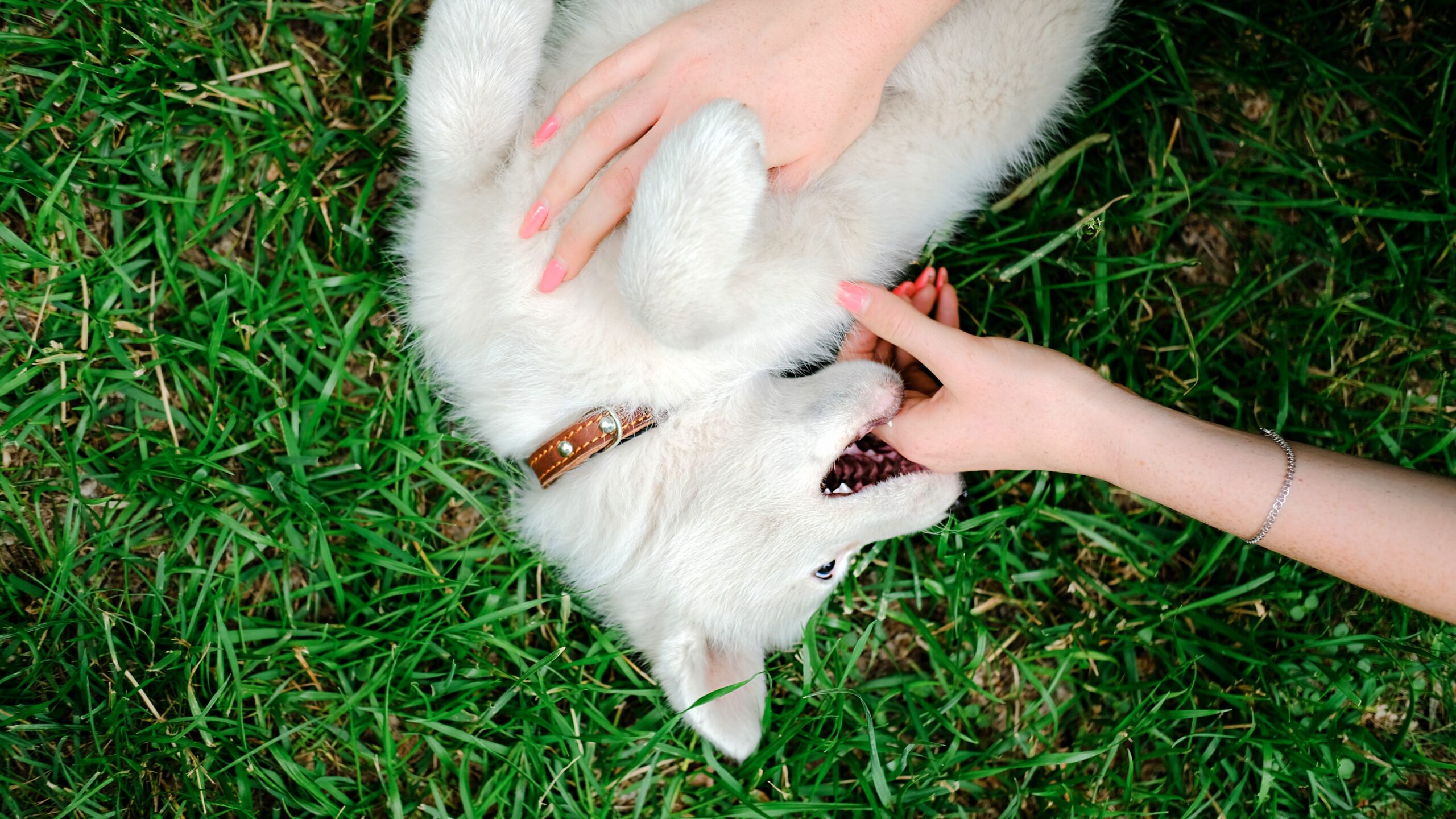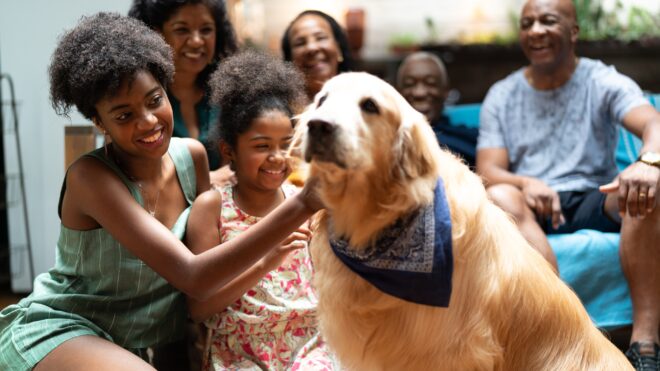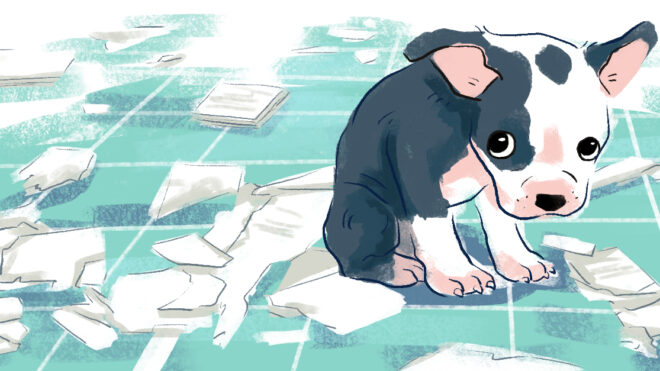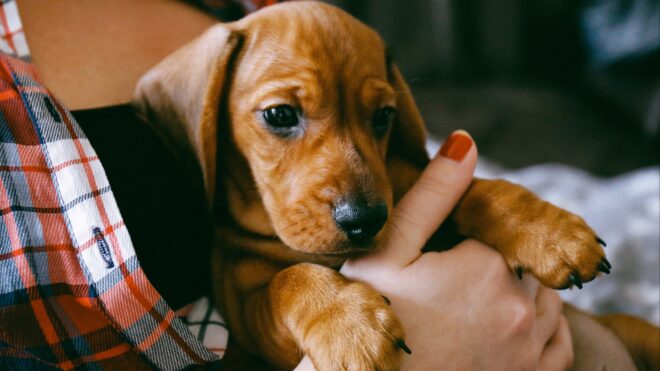
Sharkadoodle and flying piranha are just a few of the nicknames puppy parents frequently give their new additions. Although we just want to hug and cuddle our fur babies, our young dogs just want to bite. It’s a challenging time for pet parents, especially if you have little kids at home.
Charlotte Reed — dog trainer, groomer, pet trend expert, and cohost of The Pet Buzz radio show — tells LittleThings, “Teething is the process by which a puppy’s first teeth (the deciduous teeth, often called baby teeth or milk teeth) appear by emerging through the gums. Puppies start to begin to teeth at 2 to 4 weeks of age.”
The American Kennel Club says, “Puppies’ mouths are filled with 28 tiny, razor-sharp teeth that seem to be attracted to nipping at your fingers and toes. Although an annoying behavior, this is completely normal for teething puppies and something you can train away.”
Marissa Sunny, dog behaviorist with Best Friends Animal Society, a leading animal welfare organization working to end the killing of cats and dogs in America’s shelters by 2025, tells LittleThings, “Just like with human children, teething can be an uncomfortable process. It is natural instinct for the puppies to want to nip and chew on things to help soothe the pain in their mouth.”
The American Kennel Club notes, “When a puppy is about three to four months old, puppy teeth begin to fall out to make room for 42 adult teeth.”
Charlotte Reed says, “Nipping can come about accidentally or intentionally. As a whole, nipping behavior is not aggressive behavior; rather, it's due to your pup's lack of self-control or understanding. Puppies nip because the want to explore your environment, to engage you in play or because [they are] teething.”
Reed notes, “It is important that pet owners recognize puppies, much like human babies, explore the world with their mouths. Baby dogs pick up and chew anything and everything. Additionally, a very young pooch may nip because he wants to engage in play or nip at each other while playing and they don’t realize how hard they are biting down. If they bite too hard, another pup will yelp to vocalize to nipping pooch that [the] biting is too hard. Puppies also nip, or in this case chew, because they want to relive teething pain. For puppies, chewing can soothe sore gums. By providing your dog with appropriate toys, you will prevent a puppy to chew an inappropriate object. Certain breeds like corgi, German shepherd, collies, shelties, Australian cattle dog, and Spanish water dogs will inherently nip.”
Jo Myers, practicing DVM on Vetster, says, “Toys to help with teething are usually pliable, and some can be chilled. You can make one yourself by taking an athletic sock and tying some knots in it, soaking it in water, wringing it out, and putting it in the fridge. As with any toy, supervise your puppy and throw it away once it becomes stringy. Knotted cotton rope chews are another great option for teething puppies. These can also be wetted down and chilled.”
In addition to helping ease a puppy’s pain, pet parents need to curb the nipping behavior. Marissa Sunny says, “Even though it can seem cute or harmless when they are young and small, we do not want to encourage this behavior. I recommend making a noise such as ‘eh’ or ‘ow,’ stop petting them or playing with them, and offer a more appropriate toy to chew on.”
Reed advises, “Once your dog stops nipping, praise the behavior. If your dog does not react, tell him ‘no!’ You can also offer him appropriate chew toys. If he fails to get it, stop playing with him. Perhaps you will need to give him time-out by putting him in his crate, until he is calm.”
Sunny says, “It is important to work with children to manage and supervise their interactions with puppies at the teething age. When puppies begin to chew or nibble on children, instruct them to walk away from the puppy. This will teach the puppy that is they nip, they will no longer get to play or interact with their friends.”
Jennifer Bruns, DVM, MPVM at PetSmart Veterinary Services, says, “Make sure children don’t wave their fingers or toes in any puppy’s face, as this will likely be met with a friendly nip. It’s not recommended to let them play tug-of-war either. Talk to your kids so they know that puppies nip and what they should do in that situation. Make sure they know to be gentle with the puppy as well.”
Reed says, “Child and puppy play should always be supervised. Before a family gets a dog with children, the children should have a firm understanding of how to play with a dog. Parents or a trainer should demonstrate how to appropriately play with a dog. If a dog nips a child, the dog should be crated. The child should be examined for broken skin and medical attention should be administered. Parents should be able to talk to the child about what happened and explain how to handle the situation. This is exactly why parents need to do their research and choose a dog breed that is child-friendly.”
If your puppy growls when it nips, Sunny says, “Growling is often a sign of discomfort and a warning to stop what you are doing. If your puppy is growling, disengage. If this becomes an ongoing issue, I would recommend reaching out to a canine behavior specialist to evaluate your puppy and come up with a plan to make sure that everyone is comfortable and safe.”
Rest assured, if your puppy nips, it doesn’t mean your dog will grow up to be aggressive. “Puppy nipping has little to no correlation to adult dogs biting,” says Sunny. “If puppy nipping is not corrected when they are young, adult dogs may attempt to play-bite, but bites out of fear or overstimulation are not related to puppy nipping.”
Teething may lead your pup to chew furniture. Reed says, “Puppies need appropriate toys with different texture, sizes, and shapes. Toys should be rotated on a regular basis so they do not get bored. Bored puppies will look for something else to chew. At a young age, they will not know what is appropriate and what is not.”
Sunny says, “The best form of training is management. I recommend crate training to give your puppy a safe space to rest and play when you are not able to watch them. When you are watching them, if they attempt to chew on furniture or other things they shouldn't chew on, give a quick ‘eh!’ noise and then redirect them to a toy they are able to chew on. When they are chewing on the toy, give them praise.”
Burns says, “If your puppy has too much energy, they might resort to nipping. Provide your puppy with physical and mental exercise to help prevent excess nips and keep them engaged and active.”







